Doing Business in Arab Countries: Opportunities and Potential
Estimated reading time: 18 minutes
Key Takeaways
- The Arab region offers significant business and investment opportunities for Vietnamese enterprises, especially in the UAE and Saudi Arabia.
- Potential sectors include energy, high technology, tourism, logistics, and particularly Halal food.
- Understanding Arab business culture, respecting Islam, and building personal relationships are very important.
- It is necessary to grasp the import-export process, documentation regulations, especially the Halal certification.
- Many Arab countries have investment incentives and tax exemptions in free trade zones.
- Building a culturally appropriate marketing strategy and sustainable partnerships is key to success.
Table of Contents
- Understanding the Arab Market and Potential Sectors in Qatar
- Cooperation and Investment Opportunities in the UAE and the Region: Promoting Vietnam – Arab Trade
- Import-Export Process with Arab Countries and Notes on Exporting Halal Food to Saudi Arabia
- Financial and Legal Support for Vietnam – Arab Trade Activities
- Effective Business Strategy to Promote Vietnam – Arab Trade
- Conclusion
- Frequently Asked Questions
Doing business in Arab countries is emerging as an increasingly attractive option for Vietnamese enterprises. This region, with its strategic geopolitical position, preferential tariff policies, and growing trade relations, opens up myriad opportunities for cooperation, investment, and import-export. A clear testament to this potential is the bilateral trade turnover between Vietnam and the United Arab Emirates (UAE), which reached approximately 5 billion USD in 2021, signaling positive prospects for Vietnamese companies seeking to expand their presence in the international market.
Understanding the Arab Market and Potential Sectors in Qatar
To succeed when penetrating any new market, understanding the local context is paramount. The Arab market, while diverse, also shares common characteristics and investment hotspots that businesses need to grasp.
Market Overview
Arab countries, especially the UAE with Dubai as its center, have long asserted their position as important trade hubs, acting as an economic bridge between East and West. With a strategic location on the southeastern coast of the Persian Gulf, Dubai has developed into an international financial and logistics center, a gateway for goods and services to flow between continents. Dubai’s miraculous development is not limited to its modern infrastructure but also its dynamic business environment, attracting investment from all over the world.
Besides the UAE, the Saudi Arabian market is also a destination not to be missed. It is considered one of the largest markets in the Middle East, with a large population and significant purchasing power. In recent years, the Saudi Arabian government has been implementing many reforms, becoming increasingly open to foreign investment in various sectors, not just limited to the traditional oil industry. Saudi Arabia’s “Vision 2030” plan is a testament to the efforts to diversify the economy, reduce dependence on oil, and create new opportunities for international investors.
Key Industries and Sectors Offering Potential Business Opportunities
The Arab market is witnessing strong shifts, opening up many attractive investment opportunities in diverse sectors. Business sectors attracting investment in Arab countries include:
- Tourism and services: With luxurious destinations like Dubai, Abu Dhabi, or rich cultural heritage sites, the tourism sector and related services (hotels, restaurants, entertainment) always have great growth potential.

Arab tourism is developing strongly
- Finance: Financial centers like the Dubai International Financial Centre (DIFC) or Abu Dhabi Global Market (ADGM) provide a developed financial ecosystem, attracting banks, investment funds, and fintech companies.
- Transportation and warehousing (Logistics): The strategic geographical location along with modern seaport and airport infrastructure helps countries like the UAE become global logistics hubs.
- Consumer products: With a young population and high per capita income in many countries, the demand for high-quality consumer products, from food and beverages to electronics and fashion, is very large.
- Software and Information Technology (IT) services: Digital transformation is happening strongly in Arab countries, creating high demand for software, IT solutions, cybersecurity, and related services.
- Construction and infrastructure development: Urban development projects, transportation infrastructure, energy, and public works continue to be implemented, offering opportunities for construction contractors and material suppliers.
Notably, Arab countries are actively shifting towards sustainable economic development and diversifying income sources beyond oil. This effort creates valuable cooperation opportunities in areas of innovation, high technology, green technology, and other emerging technologies. The governments of these countries regularly introduce initiatives and support programs to attract investment into these strategic sectors.
Specifically, Qatar is emerging as a promising market with potential sectors in Qatar focusing on energy (including LNG and renewables), Islamic finance, sports and events tourism (especially after the success of the 2022 World Cup), and smart infrastructure development.
Culture and Business Etiquette to Note When Working with Arab Partners
When engaging in business in Arab countries, understanding and respecting cultural and religious factors is extremely important, especially in highly conservative countries like Saudi Arabia. In Saudi Arabia, a significant portion of the population still wishes to preserve ancient religious and traditional values. This deeply influences how they communicate, negotiate, and build business relationships.
Some points to note include:
- Respect for Islam: Islam is the main religion and has a great influence on daily life and business activities. Avoid scheduling meetings during prayer times or in the month of Ramadan (if possible).
- Building personal relationships: Arabs value personal relationships and trust. Take time to get to know your partner, chat about common topics before getting down to business.
- Patience: Negotiations may take longer than in Western cultures. Patience and flexibility are key.
- Dress code: Dress formally and modestly, especially for women when visiting conservative countries.

Arab Attire in Qatar
- Gender roles: In some traditional contexts, men may prefer communicating with men. However, this is gradually changing, especially in modern business sectors and among the younger generation.
- Greetings and communication: Handshakes are common, but wait for a female partner to offer her hand first if you are male. Use business cards (a version in Arabic is recommended) and exchange them with your right hand.
- Gifts: Gift-giving is considered a gesture of goodwill, but avoid products made from pork, alcohol, or any sensitive images.
Demonstrating understanding and respect for these cultural values not only helps avoid unnecessary misunderstandings but also provides a solid foundation for building sustainable and successful business relationships.
Cooperation and Investment Opportunities in the UAE and the Region: Promoting Vietnam – Arab Trade
The Arab region, with its dynamism, offers many cooperation and investment opportunities for Vietnamese enterprises, especially investment opportunities in the UAE. Properly grasping the potential sectors and understanding the process will help optimize benefits in Vietnam – Arab trade activities.
Promising Sectors for Cooperation and Investment in Arab Countries
Besides Vietnam’s current main export items to Arab countries such as rice, coffee, pepper, and seafood, many other sectors are opening up new potential horizons for cooperation. Arab countries, in their efforts to diversify their economies, are strongly focusing on future industries. This creates significant demand and opportunities for Vietnamese enterprises capable in the following sectors:
- Energy (especially renewable energy): Gulf countries have great potential for solar energy and are actively investing in clean energy projects to reduce carbon emissions and ensure energy security. Vietnamese companies with experience in renewable energy or supplying related equipment can find opportunities here.
- High Technology: Digital transformation, artificial intelligence (AI), Internet of Things (IoT), and financial technology (Fintech) are priority development areas. Vietnamese technology companies with innovative solutions and competitive costs can cooperate or provide services.
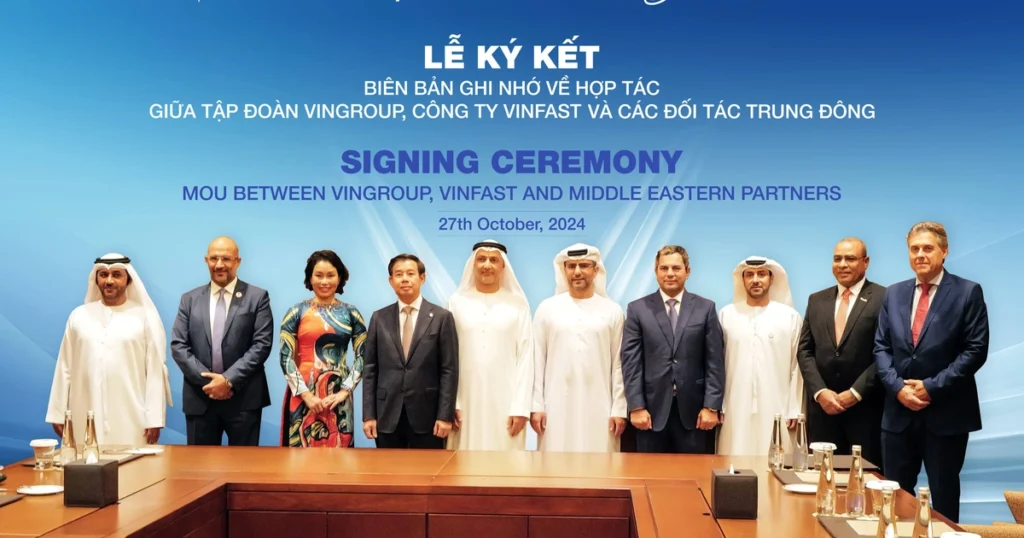
Vietnamese businesses expanding in the Middle East
- Innovation: “Smart Cities” and innovation projects are being strongly implemented. There is great demand for advanced technology solutions and smart applications for urban management, transportation, healthcare, and education.
- Green and Sustainable Technology: Solutions for wastewater treatment, solid waste management, high-tech agriculture, and environmentally friendly products are increasingly gaining attention.
- Food Processing and Agricultural Products: Besides raw exports, investing in deep processing of agricultural products and seafood to meet Halal standards and the taste of Arab consumers is also a promising direction.
Investment opportunities in the UAE are particularly attractive due to its open policies, superior infrastructure, and position as the region’s financial and commercial hub. The UAE government constantly introduces initiatives to attract foreign investment into non-oil sectors.
Successful Cases or Examples of Partnership
Interest and cooperation between businesses from both sides are increasingly solidified. A recent prominent example is the visit and work of over 70 leading Saudi Arabian companies operating in the energy sector to Vietnam. The purpose of this visit was to learn more about Vietnam’s investment attraction policies, especially in renewable energy and related infrastructure projects. This event not only showed the growing interest from Arab partners in the Vietnamese market but also opened up specific cooperation prospects in the near future.
In addition, many Vietnamese businesses in the agricultural, textile, and consumer goods sectors have also established stable distribution channels in the Arab market, gradually asserting Vietnamese product brands and quality. Vietnamese information technology companies are also starting to secure contracts for software outsourcing services and digital solutions for partners in Dubai and other emirates.
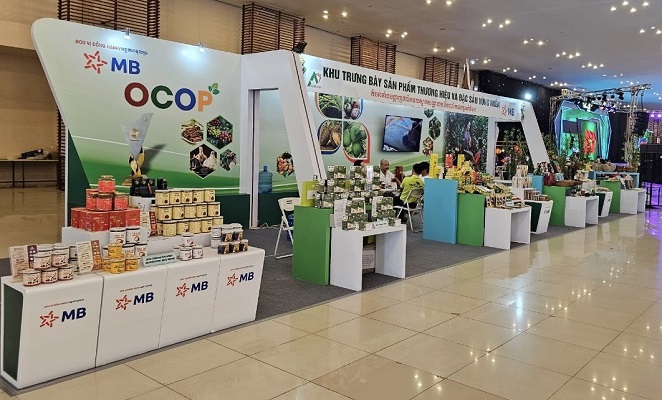
Steps to Establish Business Relationships with Arab Companies
To build a solid foundation for Vietnam – Arab trade activities and establish effective business relationships with Arab companies, Vietnamese enterprises should consider the following steps:
- Thorough Market Research:
- Gain deep understanding of the target market characteristics (size, competitors, consumer behavior).
- Master legal regulations, tariffs, and trade barriers (if any).
- Pay special attention to local business culture, communication norms, and negotiation styles.
- Participate in Trade Promotion Events and International Fairs:
- These are excellent opportunities to introduce products/services, meet potential partners in person, and update market trends.
- Large fairs in Dubai such as Gulfood (food), Arab Health (healthcare), GITEX (technology) often attract a large number of regional businesses.
- Contact the Vietnam Trade Office in Arab Countries:
- Trade Offices are important bridges, providing market information, assisting with business connections, and advising on legal procedures.
- They can help with preliminary partner assessment and introduce suitable business opportunities.
- Build a Professional Company Profile:
- Prepare company and product introduction materials in English and, if possible, in Arabic.
- The company website needs to be updated, professional, and easily accessible.
- Seek Reliable Local Partners:
- A reputable local distributor, agent, or joint venture partner who understands the local market can help businesses overcome initial barriers and reach customers more effectively.
- Conduct due diligence on potential partners carefully.
- Focus on Building Long-Term Relationships:
- In Arab business culture, trust and personal relationships are highly valued.
- Invest time in building and maintaining good relationships with partners, based on mutual respect and commitment to fulfilling agreements.
- Be Patient and Flexible:
- The process of market penetration and relationship building can take time.
- Businesses need to be patient and willing to adjust their strategy to fit market realities.
By preparing thoroughly and approaching strategically, Vietnamese enterprises can fully seize the valuable opportunities that the Arab market offers.
Import-Export Process with Arab Countries and Notes on Exporting Halal Food to Saudi Arabia
Import-export activities with Arab countries require thorough preparation regarding procedures and compliance with specific regulations, especially when exporting Halal food to Saudi Arabia or other Muslim markets. Understanding the process will help businesses save time, costs, and avoid unnecessary risks.
Overview of the Import-Export Process with Arab Countries
The process of importing and exporting goods with Arab countries generally follows international trade practices, however, each country may have specific requirements. Businesses need to pay special attention to the regulations of the specific importing country. The main steps usually include:
- Negotiating and signing the foreign trade contract: Clearly agree on terms regarding goods, price, delivery conditions (Incoterms), payment, and required documents.
- Preparing the goods: Ensure the goods meet quality standards, packaging specifications, and labeling requirements as per the contract and the importing country’s regulations.
- Applying for export license (if required): Some goods may require an export license from the Vietnamese management authority.
- Completing export customs procedures: Declare customs, pay export taxes (if any), and complete necessary procedures for the goods to be cleared.
- International transportation: Hire a transport unit (sea or air) and purchase insurance for the shipment.
- Preparing the payment documents: Collect all documents required by the contract and payment method (usually L/C or T/T).
- Completing import customs procedures in the Arab country: The importer will carry out these procedures, but the exporter needs to provide complete and accurate documents as required.
Understanding the regulations of each country is very important. For example, the UAE has relatively open regulations in free trade zones, while Saudi Arabia may have stricter requirements for certain items.

Required Documents and Regulations to Comply With
When exporting goods to Arab countries, businesses need to prepare a complete and valid set of documents. Common documents include:
- Commercial Invoice: Clearly state information about the seller, buyer, goods description, quantity, unit price, total value.
- Detailed Packing List: Describe in detail the packaging method, number of packages, net weight, gross weight of each package.
- Bill of Lading / Air Waybill: Proof of the contract of carriage and ownership of the goods.
- Certificate of Origin (C/O): Confirms the origin of the goods, usually issued by the Vietnam Chamber of Commerce and Industry (VCCI). Some Arab countries may require the C/O to be legalized by the embassy.
- Certificate of Quality/Quantity: If required in the contract, issued by the manufacturer or an independent inspection organization.
- Phytosanitary/Veterinary Certificate: For agricultural products, food, animals, and plants.
- Halal Certificate: This is a mandatory requirement for most food, beverage, pharmaceutical, and cosmetic products when exporting Halal food to Saudi Arabia and many other Muslim countries. This certificate confirms that the product is manufactured and processed according to Islamic law and does not contain prohibited ingredients (Haram). Businesses need to seek reputable Halal certification bodies recognized by the competent authority of the importing country (e.g., SFDA of Saudi Arabia).
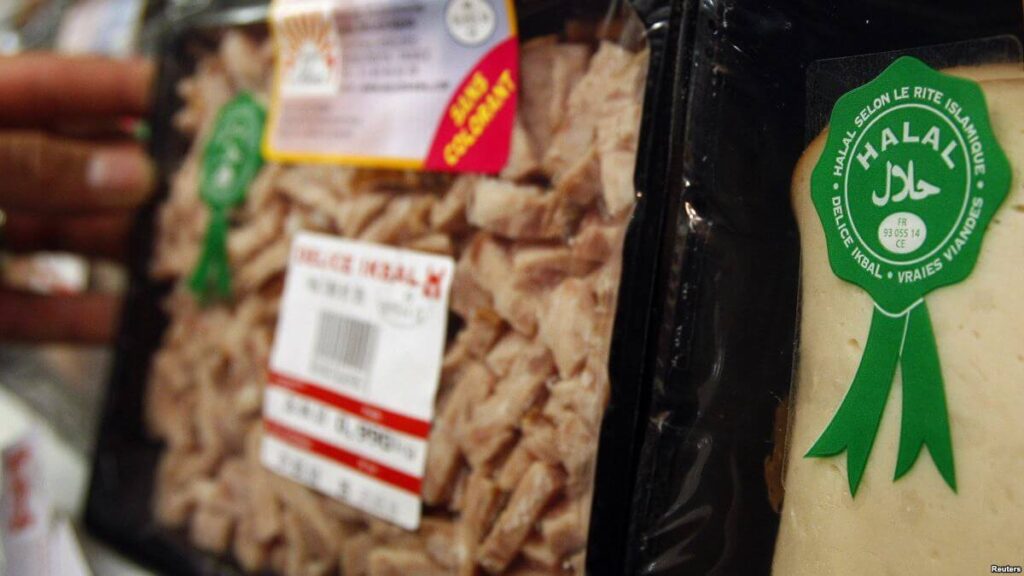
Halal Food
- Other specific licenses and certifications: Depending on the type of goods and the importing country’s regulations (e.g., SASO conformity certification in Saudi Arabia for many products).
Failure to comply with documentation regulations can lead to goods being refused entry, fines, or even destruction.
Tips to Streamline the Import-Export Process and Avoid Common Pitfalls
To ensure a smooth import-export process, businesses can apply some of the following tips:
- Work with reputable logistics and forwarding partners: Companies with experience working with the Arab market will understand the procedures and can provide effective advice.
- Thoroughly research and regularly update regulations: Import-export regulations can change. Businesses need to follow information from trade offices, embassies, or official portals of the importing country.
- Carefully check certification requirements: Especially Halal certification, ensure the certification body is recognized by the importing country. The process of applying for Halal certification can take time, so prepare early.
- Pay attention to labeling and packaging requirements: Many Arab countries have specific regulations on label language (often requiring Arabic), product information, and expiry dates.
- Clearly agree on payment terms: Prioritize secure payment methods such as irrevocable Letter of Credit (L/C), or require a partial deposit.
- Purchase cargo insurance: To mitigate risks during transportation.
- Build good relationships with the importer/local partner: They can assist with issues arising at the destination port.
- Be cautious with unusual or unclear requirements: Always verify information from multiple reliable sources.
By preparing thoroughly and strictly adhering to regulations, Vietnamese businesses can effectively exploit the huge potential from the import-export market in Arab countries, especially in the promising Halal food sector.
Financial and Legal Support for Vietnam – Arab Trade Activities
As Vietnamese businesses seek opportunities in the Arab market, understanding financial support mechanisms, investment incentives, and the legal framework is extremely important. This not only helps mitigate risks but also optimizes benefits in Vietnam – Arab trade activities.
Financial Support and Available Incentives for Businesses Operating in Arab Countries
Many Arab countries, especially the UAE, have implemented attractive policies to attract foreign investment and promote business activities. These incentives may vary between countries and even between regions within the same country.
In the UAE, some notable investment incentives include:
- No personal income tax: Employees and investors are generally not required to pay personal income tax.
- 100% foreign ownership allowed: In free trade zones, foreign investors are allowed to own 100% of the company without needing a local partner. Even for companies established on the mainland, regulations on foreign ownership have been significantly relaxed for many sectors.
- Free repatriation of profits: Businesses are allowed to repatriate profits and capital without restrictions or fees.
- Exemption from import and re-export duties: Goods imported into free trade zones for re-export are generally exempt from import duties.
- Corporate tax exemption: Many free trade zones offer corporate tax exemptions for a long period, potentially from 15 to 50 years, with the possibility of extension. Although the UAE implemented a 9% corporate tax from June 2023, businesses in free trade zones meeting the conditions may still benefit from a 0% tax rate.
The UAE has over 30 free trade zones spread across seven emirates, each often focusing on specific industries. Among these, prominent areas attracting many international investors include the Dubai Multi Commodities Centre (DMCC) – focusing on commodity trading, and the Ras Al Khaimah Economic Zone (RAKEZ) – providing flexible solutions for various types of businesses.
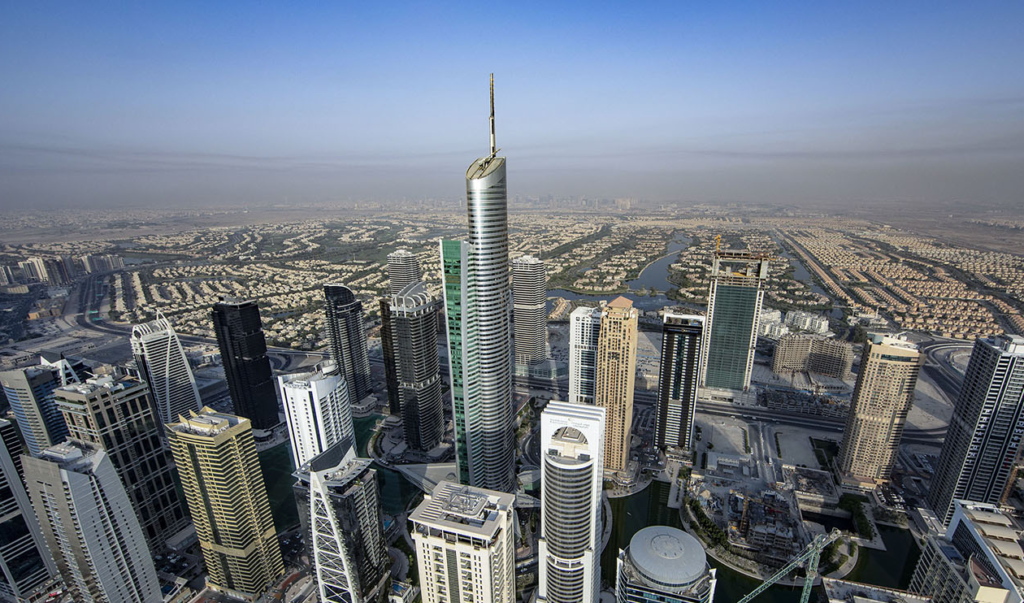
Besides the UAE, other countries like Saudi Arabia, Qatar, and Bahrain also have their own investment promotion programs, focusing on priority sectors according to their national development strategies. Businesses need to specifically research the incentives in their target market.
Legal Considerations and Requirements When Establishing a Business in the Region
Establishing a business in Arab countries requires strict adherence to local legal regulations. Some important legal considerations include:
- Choosing the business type: Common types include Limited Liability Company (LLC), Branch of a foreign company, Representative Office. Each type has different requirements regarding capital, ownership structure, and scope of operations.
- Business license: Depending on the industry and location (mainland or free zone), businesses need to apply for appropriate licenses (e.g., commercial, industrial, professional service license).
- Requirements for local partner/agent: Although relaxed, some business activities on the mainland (outside free trade zones) may still require a local partner or service agent.
- Labor law: Businesses must strictly comply with local labor laws regarding contracts, wages, working hours, employee benefits, and regulations on “Nafis” (in the UAE) or similar programs aimed at increasing the percentage of local labor.
- Tax regulations: Understand regulations on corporate income tax (if any), Value Added Tax (VAT – already implemented in many Gulf countries), and other taxes and fees.
- Intellectual property protection: Register trademarks and patents with the competent authority of the host country to protect intellectual assets.
- Dispute resolution: Understand mechanisms for resolving commercial disputes, including local courts and international arbitration centers (like DIAC in Dubai).
Resources and Organizations That Can Provide Support and Guidance for Vietnam – Arab Trade Activities
Vietnamese businesses are not alone in their journey to explore the Arab market. Many resources and organizations are available to provide information, support, and guidance:
- Vietnam Trade Offices in Arab countries: These are the most important points of contact. Trade Offices (under the Ministry of Industry and Trade) have offices in the UAE, Saudi Arabia, and some other countries, providing updated market information, assisting with trade connections, introducing partners, and advising on legal and procedural matters.
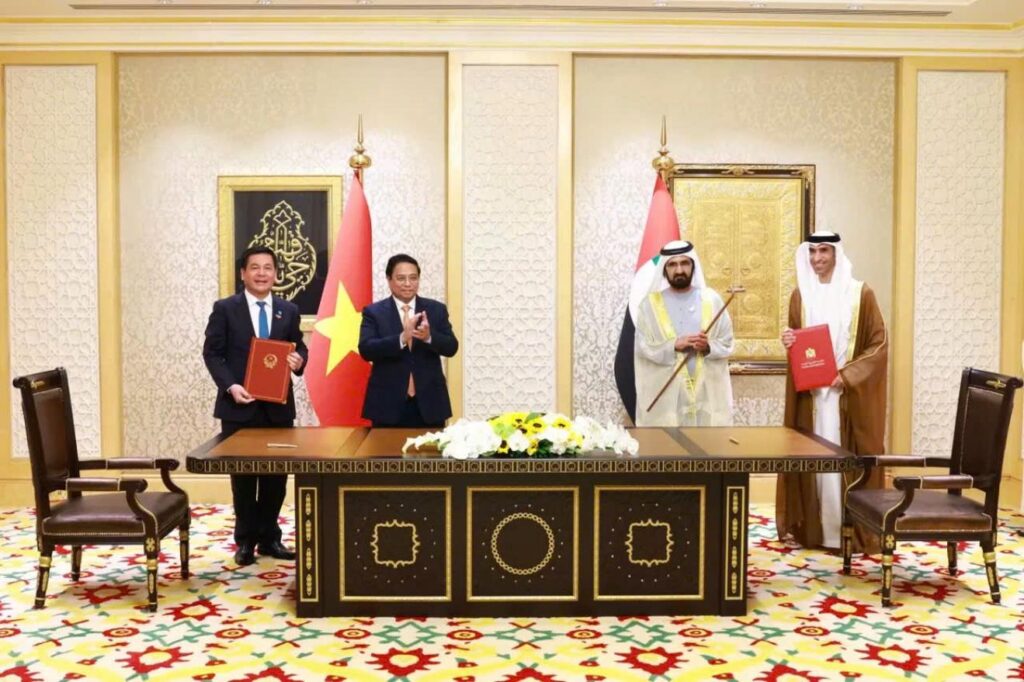
Vietnam’s Minister of Industry and Trade Nguyen Hong Dien and UAE’s Minister of State for Foreign Trade Thani bin Ahmed Al Zeyoudi sign the CEPA Agreement – Photo: Duong Giang/VNA
- Vietnamese Embassies in Arab countries: Provide consular support and general information on bilateral relations.
- Local Chambers of Commerce and Industry: For example, the Dubai Chamber of Commerce and the Abu Dhabi Chamber of Commerce provide information about the business environment, business directories, and organize networking events.
- Business associations: Vietnamese industry associations and bilateral business councils (if any) are also valuable sources of information and support.
- Professional consulting firms: Law firms, tax consultants, and company formation consultants with experience in the Arab market can provide specialized services, helping businesses navigate complex procedures.
- Banks and financial institutions: Some Vietnamese banks have partnerships with banks in Arab countries, or international banks with branches in both regions can assist with financial solutions and international payments.
Effectively leveraging these resources will help Vietnamese businesses be more confident and make informed decisions when engaging in Vietnam – Arab trade activities.
Effective Business Strategy to Promote Vietnam – Arab Trade
To achieve sustainable success and maximize benefits from Vietnam – Arab trade activities, businesses need to build a comprehensive business strategy tailored to the specific characteristics of this market, which is full of potential but also not without challenges.
Best Practices for Doing Business in Arab Countries
Doing business in a different cultural and legal environment requires careful preparation and a smart approach. Here are some tested best practices:
- Extensive Research and Understanding of the Local Market:
- Go beyond statistics; learn about consumption trends, preferences, shopping habits, and cultural factors influencing customer decisions.
- Thoroughly analyze competitors, both local and international businesses operating in the market.
- Build Strategic Partnerships with Experienced Local Partners:
- A reputable local partner (distributor, agent, joint venture partner) can help you overcome language barriers, cultural differences, and complex administrative procedures.
- They also possess a network of contacts and market understanding that is difficult for a new business to acquire.
- Ensure Strict Compliance with Local Laws and Regulations:
- Strictly comply with regulations on trade, investment, labor, taxes, and product standards (e.g., Halal, SASO).
- Consult with local legal experts to ensure all activities are legal.
- Leverage Investment Incentives in Free Trade Zones and Special Economic Zones:
- Carefully research tax benefits, ownership rules, and administrative procedures in these zones to optimize costs and operational efficiency.
- Choose the most suitable zone for your industry and business scale.
- Focus on Product and Service Quality:
- The Arab market, especially GCC countries, tends to prefer high-quality products.

Bakhoor – the tradition of burning incense in the Middle East
- Professional customer service and attentive after-sales care are also important factors in retaining customers.
- The Arab market, especially GCC countries, tends to prefer high-quality products.
- Adapt Products/Services to Fit the Market:
- Adjust packaging, labeling, flavor (for food), or product features to meet the tastes and requirements of local consumers.
Marketing and Branding Strategy Suitable for the Arab Market
Approaching Arab customers requires a culturally sensitive marketing and branding strategy:
- Localize Marketing Materials:
- Accurately and culturally appropriately translate advertising materials, websites, and social media content into Arabic (and English, as it is also a common business language).
- Use images, colors, and messages that align with local cultural and religious values, avoiding sensitive elements.
- Leverage Popular Digital Marketing Channels:
- Social media (Instagram, Snapchat, Twitter, Facebook, TikTok) has a very high usage rate in this region.
- Influencer marketing is an effective channel, especially with the younger generation.
- Optimize for search engines (SEO) in both English and Arabic.
- Build Strong Brand Awareness Through Advertising and PR:
- Consider advertising on traditional media (TV, newspapers) if suitable for your target audience.
- Participate in industry exhibitions and events to increase brand visibility and network.
- Proactive public relations (PR) activities to build a positive image for the business.
- Respect Cultural and Religious Values in Communication:
- Marketing campaigns must demonstrate respect for Islam and local traditions.
- Avoid using images or content that could be considered offensive or inappropriate.
Building Long-Term Relationships and Trust with Arab Partners
In Arab business culture, personal relationships and trust (often referred to as “wasta”) play an extremely important role, sometimes even more so than purely business factors:
- Invest in Frequent and Direct Communication:
- Prioritize face-to-face meetings when possible. Regular visits will help strengthen relationships.
- Maintain regular contact via email, phone, but don’t forget the value of warm conversations.
- Keep Commitments and Demonstrate Reliability:
- Always deliver on your promises, from product quality and delivery time to contract terms.
- Transparency and honesty are the foundation of trust.
- Show Genuine Interest in Local Culture and Traditions:
- Learn about your partners’ holidays and customs.
- A few greetings or well wishes in Arabic can make a good impression.
- Be Patient and Build Relationships Step by Step:
- Trust cannot be built overnight. Be patient and invest time in nurturing relationships.
- See partners not just as business associates but also as friends.
- Listen and Respect Your Partners’ Opinions:
- Show respect for their experience and understanding of the local market.
- Be willing to listen and accept feedback.
By consistently applying these strategies, Vietnamese businesses can build a solid position, effectively leverage Vietnam – Arab trade opportunities, and contribute to the economic development of both sides.
Conclusion
In summary, doing business in Arab countries presents a promising picture with numerous cooperation, investment, and import-export opportunities for Vietnamese enterprises. From dynamic markets like the UAE with attractive investment opportunities in the UAE, to large markets like Saudi Arabia with increasing demand for exporting Halal food to Saudi Arabia, or potential sectors in Qatar that are rapidly developing, this region is truly a strategic destination.
Attractive sectors for Vietnamese businesses include renewable energy, high technology, agricultural products and processed food, tourism, and services. However, to succeed, understanding the local business culture, legal regulations, and building trustworthy partnerships are key factors. The governments of Arab countries also offer many financial and legal support policies, especially in free trade zones, creating favorable conditions for investors.
We encourage Vietnamese enterprises to boldly explore and discover these valuable opportunities. Be proactive in connecting, participating in forums and trade fairs to grasp information and build networks.
To learn more and receive specific consultation for your Vietnam – Arab trade plan, do not hesitate to contact business consulting experts or attend upcoming trade promotion events. The door for cooperation with the Arab world is wide open, and this is the time for Vietnamese enterprises to seize the opportunity.
Frequently Asked Questions
1. What are the most important cultural considerations when doing business in Arab countries?
When doing business in Arab countries, the foremost important thing is to respect Islam, as this religion greatly influences life and business. Be mindful of prayer times, avoid Ramadan if possible. Building personal relationships and trust are highly valued by Arabs, so take time to get to know your partners. Patience in negotiations, dressing formally and modestly, and paying attention to greetings and business card exchange etiquette (with the right hand) are also essential factors.
2. Which sectors are considered most promising for Vietnamese enterprises investing in the UAE?
The UAE offers many attractive investment opportunities, especially in sectors such as renewable energy (especially solar energy), high technology (AI, IoT, Fintech), innovation (smart cities), green and sustainable technology, and processed agricultural food products according to Halal standards. The UAE’s open policy, superior infrastructure, and position as a financial and commercial hub, along with incentives in free trade zones, are favorable factors.
3. Are there any special requirements for exporting Halal food to Saudi Arabia?
Yes, exporting Halal food to Saudi Arabia requires a mandatory Halal certificate. This certificate must be issued by a reputable Halal certification body recognized by the competent authority of Saudi Arabia (e.g., SFDA). Products must strictly comply with Islamic law regulations during manufacturing and processing, and must not contain prohibited ingredients (Haram). In addition, attention should be paid to labeling requirements (often including Arabic) and other import documents according to regulations.
Vietnamese businesses can seek support from various sources. The Vietnam Trade Offices in Arab countries are important points of contact providing market information, connections, and consultation. Vietnamese Embassies, local Chambers of Commerce and Industry (like the Dubai Chamber), and business associations are also useful sources of information. For specialized support, law firms, tax consultants, and company formation consulting firms with experience in the Arab market can assist. Regarding finance, many Arab countries, especially the UAE, have investment incentive policies such as tax exemptions in free trade zones.

